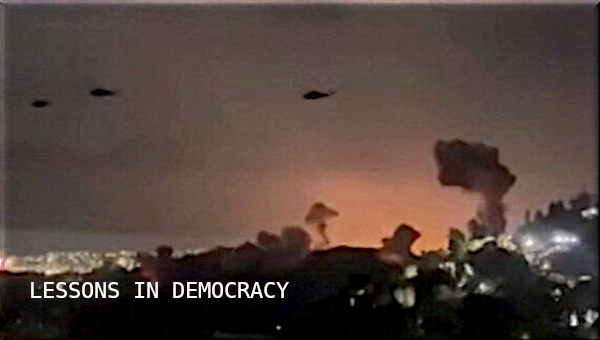
In a recent policy paper by the New American Foundation (among whose board members sits Francis 'End of History' Fukuyama), it is argued that the next U.S. administration must engage Iran with a 'grand bargain', which addresses both Iran and the U.S.'s strategic concerns. The paper argues that the piecemeal approach the U.S. has taken towards Iran has clearly failed to change the behavior of the regime in Iran, and a détente is not a desirable option. The only stable and strategically appropriate path to take is a full rapprochement.
The policy paper is very frank in its approach, as imperialists usually are among themselves. It argues that Iran is strategically too important to be alienated, and argues that in the absence of a full rapprochement, Iran's leaders will have no choice but to flea to the Russian and the Chinese spheres of influence. Iran's hydrocarbon resources are vast (second in the world, in combined oil and gas), and it's strategic positioning in the Middle East is not something the U.S. can afford to do without for much longer. More importantly, Iran's animosity toward the U.S. can be detrimental to the advance of the American interests in the region. So, the best thing to do is for the U.S. to strike a 'grand bargain' with a regime that has historically proven that it can cooperate with the U.S., but has never been rewarded fully for its past cooperation both in fighting the Taliban regime and their overthrow, as well as in the American military and political designs for Iraq.
The wish list of things to be granted by the U.S. and Iran in such a grand bargain include the familiar demands: Iran is to modify its nuclear program to accommodate western powers' concerns, disavow the 'terrorist' organizations such as Hamas, Hezbullah and the Islamic Jihad, and help stabilize the region for Uncle Sam. In turn, the U.S. is to guarantee that it will not militarily (or otherwise) try to change Iran's borders or its form of government, lift all unilateral sanctions against Iran, and generally play nice.
Of particular interest is the following passage from the policy paper: "During their dialogue with U.S. counterparts over Afghanistan in 2001-03, Iranian diplomats indicated their interest in working with the United States to establish a regional security framework focused on Central Asia. Other senior Iranian officials raised such a possibility with us in 2003-04." Hardly an anti-imperialist stance on the part of the Iranian regime! On the contrary, this is clearly indicative of a regime with ambitions for becoming a cop on the beat (much like the Shah's regime was for the Americans), and wants that role officially sanctioned by the biggest cop on the global beat, the U.S.
These are recommendations of a group of professionals whose bread is buttered by thinking ahead and advising Uncle Sam on the best course of action to take, in order to secure its long-term geo-strategic interests. The analysis provided by the New American Foundation shows that powerful forces within the imperil halls of the U.S. also find the 'cop on the beat' scenario for Iran as something desirable.
This line of thinking is not isolated to think tanks, as attested to by a Time magazine article of 4 October 2008, titled, "Changing the conventional wisdom about Iran." In this Time article, France is portrayed as the key European power to lead the charge for a strategic adjustment of policy as regards Iran.
As reported there: "'The opportunity is there to move past the 30 year-old images of a defiant and frightening revolutionary Iran, and start encouraging cooperative behavior by engaging with Iran as the swiftly-developing nation and regional power it is,' says Bernard Hourcade, an Iran specialist at France's National Center for Scientific Research. 'The key is direct American involvement in relations, because renewed ties with the U.S. is what Iran wants most'."
Further, the Time article reports: "'Iran's biggest strategic concern is obtaining security assurances and accords, and the only nation that can provide those is the U.S.,' says Didier Billion, deputy director of the Institute on International and Strategic Relations in Paris. The logic behind that view is supported by Thomas Fringar, chairman of the U.S. National Intelligence Council and the senior analyst in Washington's intelligence community."
There have been other indications as well. For one, there have been reports on the volume of U.S.-Iran trade, which have increases ten fold during the Bush administration. Another highly telling development was the plans of Bush administration to open a diplomatic post in Iran (see here). Though the plan was shelved, "in part over fears it could affect the U.S. presidential race or be interpreted as political meddling," other reports indicate that it is still under consideration. If the Bush administration's stated animosity toward Ahmadinejad's administration (or the Iranian regime as a whole) were as deep-rooted as the alarmists have been stating, whence did these considerations of opening a diplomatic post materialize?
The truth is that American imperialism is not on very solid foundations. Besides its military power, which alone does not acquire one an empire, most other aspects of its power are on very shaky ground, as the current financial meltdown has made plain. For its maintenance therefore it requires two things: prevention of other powers from rising, and a host of client states in geo-strategically important regions. The grand bargain discussed here addresses both requirements.
To sum, these are important signs and the writing is on the wall that neither this nor the next president of the U.S. will be looking at bombing Iran; rather, he'll be likely offering the regime of the mullahs yet more cakes and the keys to the heavens the mullahs have been asking for.
Read the complete article here ...







No comments:
Post a Comment